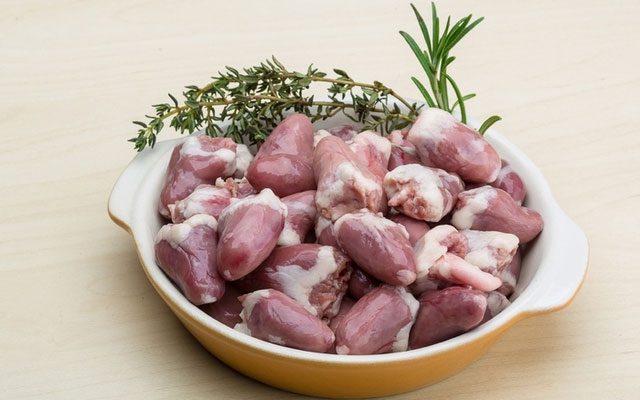Chicken is a type of poultry that is low in fat, low in calories, and rich in protein. In Traditional Chinese Medicine, chicken meat is considered sweet in taste, warming in nature, and non-toxic. This meat is known to help warm the body, boost energy, and nourish the essence and marrow.
Moreover, chicken is also a nourishing food for individuals who are thin, have lost weight, are weak, suffer from bloating, poor appetite, diarrhea, dysentery, edema, frequent urination, low urine output, leukorrhea, have low milk production after childbirth, or are diabetic.
However, not only the meat, but another part of the chicken is also hailed as a superfood due to its high nutritional value. This is the chicken heart.
What are the benefits of chicken hearts?
According to Healthline, chicken hearts are highly nutritious. They contain calories, protein, fat, carbohydrates, vitamin B6, zinc, iron, folate, and more. Chicken hearts are particularly rich in vitamin B12, an essential micronutrient that plays a crucial role in DNA synthesis, red blood cell formation, and maintaining healthy nerves.

Chicken hearts are very rich in iron.
Chicken hearts are also high in zinc, one of the beneficial micronutrients for individuals with type 1 and type 2 diabetes. Zinc helps improve blood sugar control, promotes healthy triglycerides, and boosts good cholesterol levels. Supplementing with low doses of zinc (under 25 mg) can positively impact fasting blood sugar, triglycerides, total cholesterol, and bad LDL cholesterol.
Protein is another nutrient found in chicken hearts. Protein, composed of amino acids, can increase the production of hormones like PYY and GLP-1, which help suppress hunger and cravings for hours after a meal. Therefore, this food is beneficial for weight loss.
Additionally, chicken hearts are rich in iron, an essential component for oxygen transport, DNA synthesis, and red blood cell production.
According to Health & Life, it is estimated that around 1.6 billion people worldwide suffer from iron deficiency, which is the most common nutritional deficiency globally. This can lead to a range of symptoms, including weakness, fatigue, weakened immunity, and digestive issues.
Incorporating iron-rich foods, including chicken hearts, into meals is one of the best ways to ensure you meet your body’s iron needs.
Notably, chicken hearts also have the effect of nourishing blood and energy, providing certain health benefits. If your skin appears pale or your hands and feet are often cold, consuming chicken hearts may help improve these conditions.
Things to consider when using chicken hearts
While chicken hearts are a healthy and nutritious addition to most adults’ diets, there are some important considerations to keep in mind:
Individuals with gout should limit their intake of this food. Chicken hearts contain a high level of purines, a compound found in many foods, especially organ meats. When your body breaks down purines, it can raise uric acid levels, which may accumulate in your joints and trigger gout attacks. For this reason, individuals with gout are sometimes advised to follow a low-purine diet and limit foods like chicken hearts.
Currently, there are many packaged and frozen chicken heart products available on the market. However, to purchase high-quality, nutritious chicken hearts, it is advisable to shop early in the morning. Choose hearts that are bright red and fresh, and avoid those that are pale or dark in color. Chicken hearts are usually not very large, so select those that are of moderate size. It’s also important to choose hearts that have a good bounce. After purchasing, ensure to wash them thoroughly with salt, and remove any fat and the outer membrane before cooking.
Chicken hearts can be prepared by grilling, stir-frying, or stewing, all of which are delicious methods. Nutrition experts recommend that each serving should consist of no more than 50 grams of chicken hearts to ensure safety for your health.



















































